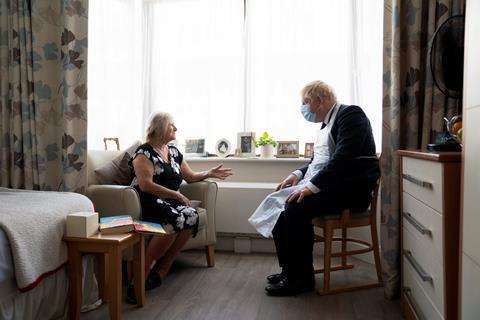Boris Johnson has raised national insurance in a pledge to end the “catastrophic” costs of social care. But Alexandra Davis takes issue with the word, and says every individual is of infinite worth to God

Yesterday the Prime Minister announced a very welcome funding increase for the NHS and social care sector. Leaving aside the complexities of how the increase will be paid for, and the disappointment of seeing that social care funding will only kick in after three years of (much-needed) investment in the NHS, the thing that stuck with me was Downing Street’s phrase “the catastrophic cost of care”.
Exactly what is it that we think is so catastrophic about the cost of care for disabled and older adults? We rarely talk about the cost of other healthcare in the same way – I’ve never heard of the “catastrophic” cost of neo-natal care or of cancer care. We all understand that healthcare costs money, and a lot of it (the NHS recently licensed a drug that costs £1.8m per dose) but why do we decide that these levels are catastrophic when it comes to vulnerable adults?
As Christians, we know that all people are precious, lovingly created in the image of God (Genesis 1:26-27). There’s no sell-by date on people or requirement that we are physically or mentally able to complete a series of tasks to be worthy of love by our creator God. We know there’s no age at which Jesus’ saving work on the cross no longer applies, no circumstance, be that physical or mental disability, including dementia, at which a person cannot know, love, and follow God (1 Timothy 2:4).
There’s no sell-by date on people or requirement that we are able to complete a series of tasks to be worthy of love by our creator God
At Pilgrims’ Friend Society we work hard to support older people, primarily through the provision of care homes and independent living housing schemes. None of our care homes charge more than £1300 a week for permanent residents even at the highest level of need. This includes our brand new, state-of-the-art, care home that opened this summer in Chippenham. That might sound like a lot, and it is, but nothing about it is frivolous. That covers shelter, food, and personal care, but it also covers community, friendship, activities, and Christian devotions and services. For those living with dementia, it covers specialist training and understanding of the experience that those living with dementia go through and the ways to care for them and draw them out every single day. Above all, it covers safety and security and peace of mind both of those who live in the home and for those who love them.
It’s also worth remembering that that £1300 pays the wages of incredible people who, day in and day out, do the sometimes unglamorous work of personal care. They don’t just dole out medicine or do a cursory job of getting people dressed in the morning - they brush hair, sing to their charge, ask after the family, share their own joys and challenges. They pick up extra shifts at short notice, do the laundry, carefully and tenderly feed those who can’t feed themselves anymore. The cost of care isn’t just about the person receiving care, it’s also about the person giving it – it’s about trying to make sure that our brilliant carers are also recognised as carriers of the Image Dei, that they are precious, loved, and counted worthy by God by creating good working conditions and remunerating them appropriately.
So what exactly is so catastrophic about the cost of care? Yes, there can be difficult and emotional decisions that have to be made to pay for care in this country. Our system is a very long way from perfect and the move to receiving care, whether at home or in a care home, can be a challenging experience. But setting aside those very real challenges, when we really look at how much we pay to provide great care to vulnerable adults, how could we ever think that £1300 is too much?




































